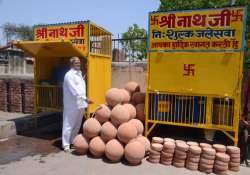Agra's free water service completes 30 years
Agra: An initiative run by volunteers to provide free and cold drinking water to all completes 30 years of service in the Taj city.Each summer, a group of thirst quenchers who have banded themselves together

Agra: An initiative run by volunteers to provide free and cold drinking water to all completes 30 years of service in the Taj city.
Each summer, a group of thirst quenchers who have banded themselves together in the Sri Nath ji Nishulk Jal Sewa, armed with buckets and trolleys set up water kiosks at most busy crossings here.
'It is neither a registered NGO nor a formal structured institution with a constitution. The members share a passion to ensure no one remains thirsty,' Bankey Lal Maheshwari, who coordinates the group activities, told IANS Sunday.
From its modest beginning in the early 1980s, the Jal Sewa network today runs 70 odd water points in the city, besides a dozen night shelters in winter.
For a thirsty person in the scorching summer of Agra, a mugful of cold scented water is like nectar, says physician M.C. Gupta.
Maheshwari recalls the group's service expanded after a tragic train accident in 1987.
'It was a hot June afternoon and there was no drinking water available at the platform. Some of us got together and bought buckets and mugs, arranged for ice and provided water to the victims,' he recalls.
Maheshwari says funds for the initiative come from those who donate voluntarily.
Rajan Kishore, a member, adds: 'The hygienic standards are high and the service employs more than 75 old men and women.'
Each summer, a group of thirst quenchers who have banded themselves together in the Sri Nath ji Nishulk Jal Sewa, armed with buckets and trolleys set up water kiosks at most busy crossings here.
'It is neither a registered NGO nor a formal structured institution with a constitution. The members share a passion to ensure no one remains thirsty,' Bankey Lal Maheshwari, who coordinates the group activities, told IANS Sunday.
From its modest beginning in the early 1980s, the Jal Sewa network today runs 70 odd water points in the city, besides a dozen night shelters in winter.
For a thirsty person in the scorching summer of Agra, a mugful of cold scented water is like nectar, says physician M.C. Gupta.
Maheshwari recalls the group's service expanded after a tragic train accident in 1987.
'It was a hot June afternoon and there was no drinking water available at the platform. Some of us got together and bought buckets and mugs, arranged for ice and provided water to the victims,' he recalls.
Maheshwari says funds for the initiative come from those who donate voluntarily.
Rajan Kishore, a member, adds: 'The hygienic standards are high and the service employs more than 75 old men and women.'